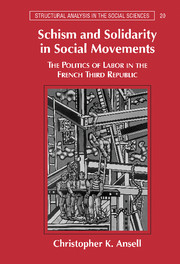
-
Select format
-
- Publisher:
- Cambridge University Press
- Publication date:
- July 2009
- October 2001
- ISBN:
- 9780511499357
- 9780521791137
- 9780521033961
- Dimensions:
- (228 x 152 mm)
- Weight & Pages:
- 0.6kg, 294 Pages
- Dimensions:
- (228 x 152 mm)
- Weight & Pages:
- 0.447kg, 296 Pages
- Subjects:
- Social Theory, Political Sociology, Sociology
- Series:
- Structural Analysis in the Social Sciences (20)
You may already have access via personal or institutional login- Subjects:
- Social Theory, Political Sociology, Sociology
- Series:
- Structural Analysis in the Social Sciences (20)
Book description
Like many organizations and social movements, the Third Republic French labour movement exhibited a marked tendency to schism into competing sectarian organizations. During the roughly 50-year period from the fall of the Paris Commune to the creation of the powerful French Communist Party, the French labour movement shifted from schism to broad-based solidarity and back to schism. In this 2001 book, Ansell analyses the dynamic interplay between political mobilization, organization-building, and ideological articulation that produced these shifts between schism and solidarity. The aim is not only to shed light on the evolution of the Third Republic French labour movement, but also to develop a more generic understanding of schism and solidarity in organizations and social movements. To develop this broader understanding, the book builds on insights drawn from sociological analyses of Protestant sects and anthropological studies of segmentary societies, as well as from organization and social movement theory.
Reviews
"In this book, Christopher Ansell has made an important contribution to organizational thory, using the French labor movement during teh Third Republic as his laboratory. Along the way, theoretical probability opened new windows on the history of the movement with relevance for our understanding not only of its dramatic and convoluted course but also of contemporary France. The study thus succeeds on two levels, though it is likely that sociologists will be more pleased with it than will some historians." - Journal of Modern History Christopher H. Johnson, Wayne State University
Contents
-
1 - The Struggle and the Conciliation
pp 1-14 -
-
- You have access
- Export citation
-
Metrics
Altmetric attention score
Full text views
Full text views help Loading metrics...
Loading metrics...
* Views captured on Cambridge Core between #date#. This data will be updated every 24 hours.
Usage data cannot currently be displayed.
Accessibility standard: Unknown
Why this information is here
This section outlines the accessibility features of this content - including support for screen readers, full keyboard navigation and high-contrast display options. This may not be relevant for you.
Accessibility Information
Accessibility compliance for the PDF of this book is currently unknown and may be updated in the future.


